Philly school closure plan would move Kensington students to lower-performing schools
Concerns grow that Philadelphia’s school closure plan disadvantages some already vulnerable neighborhoods.
The bill, which would ban mobile services from most of the 7th District, is up for a final vote on Thursday.

Philadelphia City Council is expected to vote Thursday on Councilwoman Quetcy Lozada’s bill that would largely ban mobile service providers from most of the 7th District.
The legislation, which has drawn significant public opposition, advanced again last Thursday after City Council approved additional amendments in a vote. The new amendments exempt city and city-contracted mobile medical providers, as well as street vendors, from the proposed restrictions.
Councilmembers Nicolas O’Rourke and Kendra Brooks were the only votes against the amended bill, while Councilmember Rue Landau, who previously opposed it, voted in favor. If approved in the final vote and signed by Mayor Cherelle Parker, the ordinance would take effect 60 days after becoming law.
The legislation requires mobile providers to obtain permits and imposes strict location and time limits on their operations.
Under the bill, non-medical mobile providers cannot stay in any one location within the 7th District for more than 45 minutes and would need to move at least 1,000 feet to be considered at a new location.
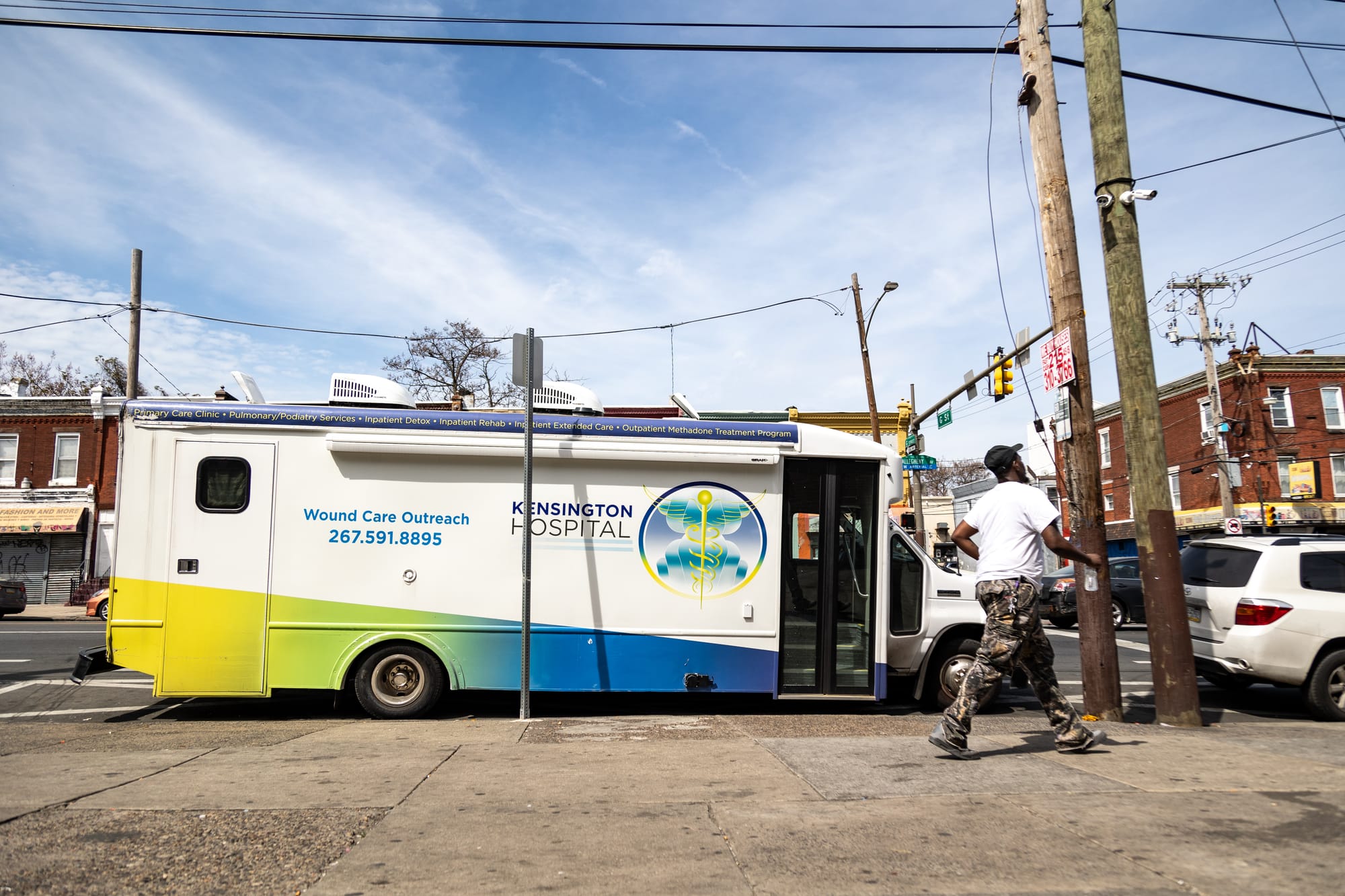
Mobile medical services would be restricted to a single, unspecified location or permitted to operate between 11 p.m. and 6 a.m. on a two-block stretch of Allegheny Avenue. Emergency medical responders, pediatric providers, and veterinary services would be exempt. Violators would be fined up to $1,000.
The legislation does not clearly designate where medical providers may operate. It lists 265 E. Lehigh Ave. as a possible site, or another to be “designated by the city,” and does not specify hours of operation. That address is home to the Kensington Wellness Center, formerly the Police Assisted Diversion (PAD) center, where people arrested through the newly launched Kensington Wellness Court are taken after their arrest.
The permitting process also remains unclear. The bill states the Department of Public Health, “or such other agency as designated by the mayor,” would establish a permitting system to regulate mobile medical services.
The latest amendments exempt certain city-run mobile medical services from these rules, including mobile crisis teams operated by the Department of Behavioral Health and Intellectual disability Services (DBHIDS), emergency overdose and infectious disease response providers, and public health vaccination efforts. Street vendors, like food trucks, are already required to obtain licenses from the Department of Licenses and Inspections to operate in public spaces.
DBHIDS’s mobile services include its 988 suicide and crisis response teams, the ARU-2 Unit, which responds to 911 calls about overdoses in Kensington, and the CIRT Co-Responder team, which pairs Philadelphia police officers with mental health professionals and recovery specialists. ARU-2 provides naloxone and pairs paramedics, case managers, and public health professionals, according to the city’s website.
Emergency overdose response services are defined in the bill as providers dispatched “upon a declaration by the Commissioner of the Department of Public Health,” to respond to a cluster of overdose events and those affected.
The Department of Public Health would not confirm if the city currently has an emergency overdose response service system as described in the bill.
“The City and Health Department are preparing for the passage of this legislation to ensure that we can both implement and enforce the provisions that are in the bill,” said James Garrow, a Department of Public Health spokesperson.
Infectious disease response has a similar definition: providers are “dispatched upon a declaration by the Commissioner of the Department of Public Health responding to a cluster of infectious diseases case reports.”
Lozada reiterated that the bill is not about banning services but that providers “will have to follow the rules.”
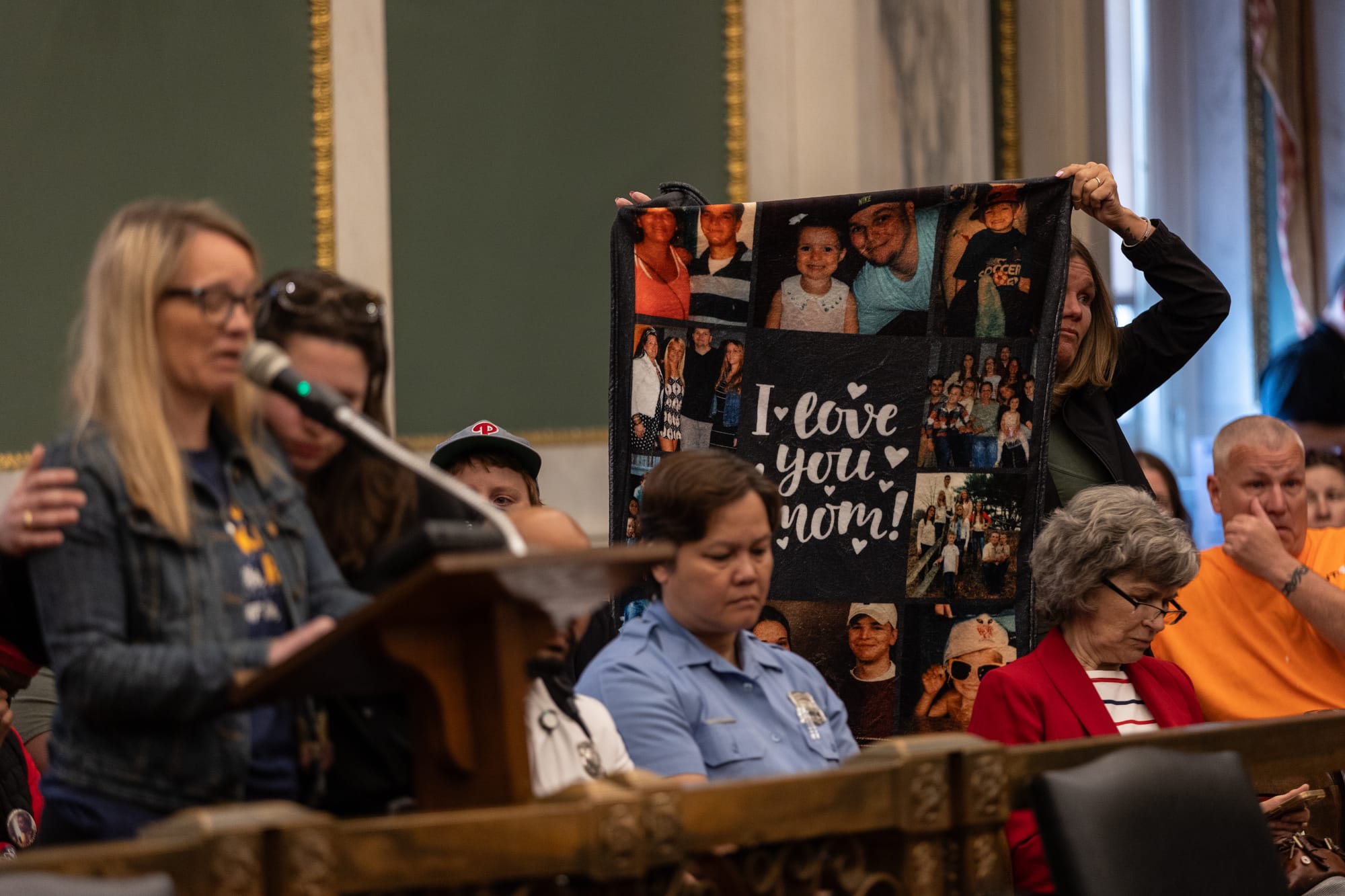
More than 20 people spoke against the bill during public comment last week after advocacy groups, including the Community Action Relief Project, Philly Democratic Socialists of America (DSA), Reclaim Philadelphia, Treatment Not Trauma, and others encouraged people to call their City Council representatives to testify against the bill on social media.
Opponents said the bill targets mutual aid groups, criminalizes those offering basic necessities like food and water to their neighbors, and increases barriers to lifesaving medical care.
Juston Roig, who testified Thursday for Philly Boricuas, described the bill as “performative” and a way to “impede harm reduction workers and the amount of aid they can provide” to people using drugs.
“Whether you like it or not, drug users are part of our community. They are people, and their health is of concern to all of us,” Roig said. “They need access to more health care and more resources, not less. Council members are creating policy off the callous impulses of a bulk minority which does not represent the diverse voices in the 7th Council District.”
Several testimonies mentioned people who have died in police custody and in Philadelphia jails following arrests in Kensington — including Joey Gabor, Amanda Cahill, Andrew Drury, and, most recently, Joshua Mister, who was arrested by SEPTA police after allegedly trying to avoid paying transit fare.
Leslie Gabor, Joey’s sister, testified through tears.
“These are services my brother benefited from. I don't want people suffering the way he did,” she said, adding that she wants people “to continue getting the medical community support they rely on ... without them, people will continue to die.”
Another relative of Joey’s held a blanket adorned with Joey’s face. Two people in the City Hall balcony held signs with the words “mobile services save lives” and “harm reduction saves lives.”
Others reiterated that services meeting people precisely where they are is vital for them to access more holistic care.
“When street medicine providers can see the environments their patients are living in, they can work collaboratively with patients to promote healthy outcomes,” said Kelsey León, a harm reduction advocate with the Community Action Relief Project (CARP). “Restricting street medicine to a single parking lot is comparable to taking away an operating room from a surgeon.”
Many argued for more attention and energy for addressing poverty and homelessness, rather than potentially reducing access to mutual aid and medical care.
“If you want to remove undesirables from your communities, this is one way to do it — harm the others who are trying to prevent their deaths,” said Ivan Vivar, a soccer coach with the Kensington Soccer Club.
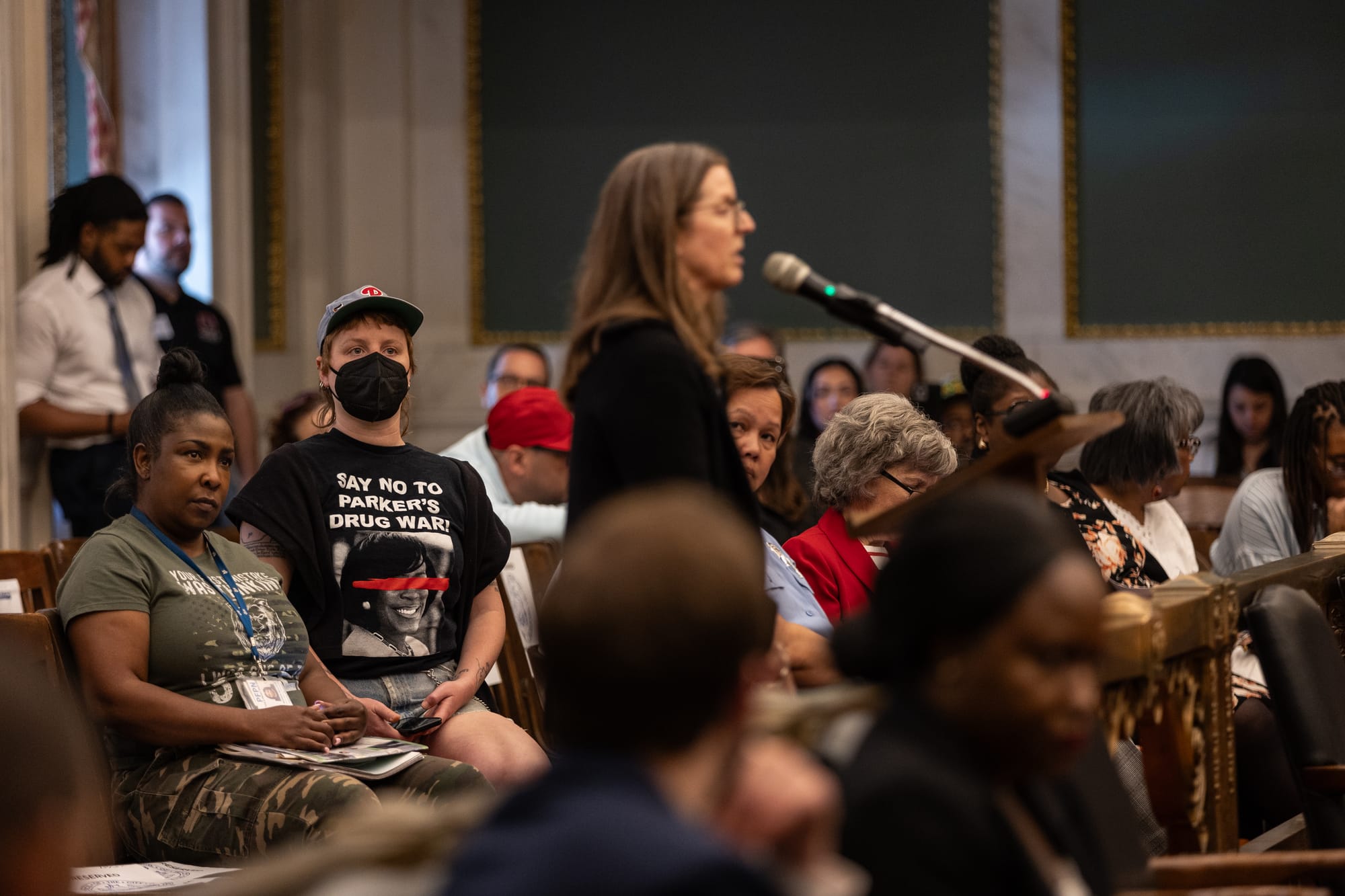
Catherine Abrams, program coordinator for Substance Use Response Guidance and Education (SURGE), which coordinates mobile medical teams in Philadelphia, expressed frustration that a provider-led effort to address operational concerns appeared to be disregarded in favor of new location restrictions imposed with little warning or collaboration on their implementation.
Abrams explained that since December, after two meetings with Lozada, providers developed a “code of conduct” to address shared “quality” concerns. Originally, she said, the idea of forcing providers to certain locations “was only proposed as an idea if quality did not improve.” However, providers learned that services would be limited to two locations “as of two weeks ago.”
“Permitting may help with that quality. We hope that can happen,” Abrams said. “But at this point, groups have not been involved in conversations about how to use the parking lot at 265 E. Lehigh ... and there's little information to guide groups about what's going to happen once things go into effect. People don't know what to tell their patients, how to find them, where to go, so people might have to get lucky.”
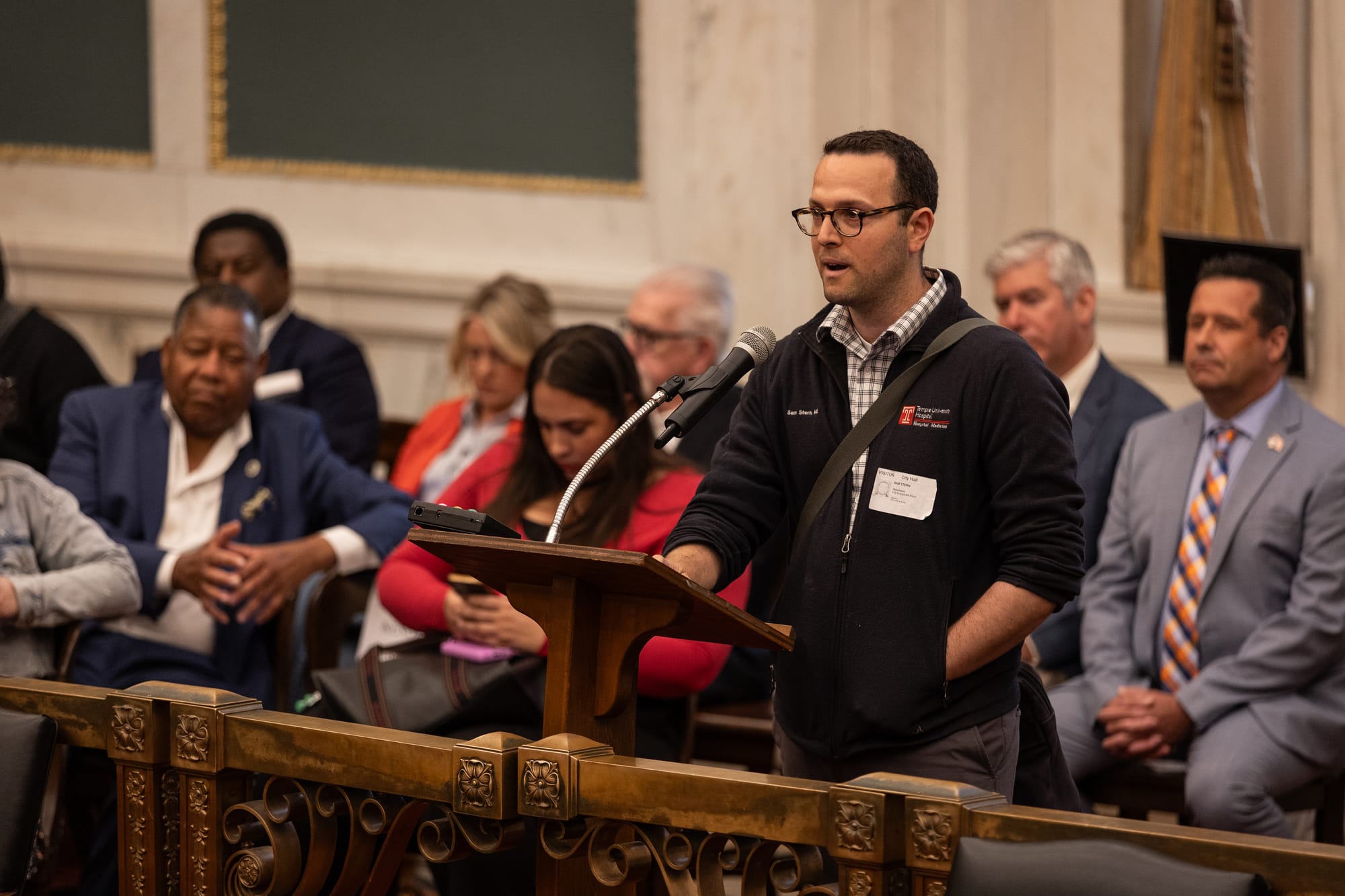
At least six medical mobile units are stationed in Kensington regularly. The idea of extending their services to 11 p.m. to 6 a.m. is baffling to those on the ground, according to one mobile health care provider who works in Kensington and requested anonymity.
They said that even if there was a demand for overnight services, which they have “never heard” participants, providers, or residents suggest, it would be practically impossible for them to offer those services under the current model.
“It’s a different universe to imagine having us out there in the middle of the night,” they said.
A primary obstacle is their staffing and medication protocols.
“Our staff are 9 a.m. to 5 p.m.,” they said, likening the suggestion to asking the daytime Kensington Wellness Court to operate overnight.
To effectively provide comprehensive care during those late hours, the provider elaborated, their entire operation would need an overhaul.
That’s partly because mobile providers don’t carry prescription medication for things like withdrawal management and wound care, which many of their participants need. Instead, they write prescriptions and send them to nearby pharmacies, which are closed overnight.
“Every staff member would have to be replaced, every mobile unit would have to have all the medication, or we’d send everyone to the Emergency Room,” they said.
Transforming mobile units to carry such a wide array of necessary medications, especially controlled substances, would essentially require them to become mobile pharmacies, the provider said. Every medical unit would need a license from the Drug Enforcement Administration (DEA) to dispense medication and a DEA-compliant safe installed in their vehicles. This would not only be costly but also a significant safety concern for staff.
“It puts a bullseye on us,” they said.
The provider said they operate a mobile unit because they struggle to get people to come to their brick-and-mortar office, located nearby. Plus, they added that meeting participants where they are allows medical teams to repeatedly engage with people and show they care. And they don’t just treat people; they also sign them up for Medicaid, increasing their future access to care.
“The whole point of that is if they are able to connect with someone else afterwards, they can go 10 feet further,” they said, adding that it is often just about keeping people alive for another week. “The point is, by having a relationship with these participants, by showing them someone cares for them, keeping them alive… we are able to connect them to inpatient treatment.”
Sam Stern, a medical practitioner with Temple University, which operates a mobile care van that treats people with opioid use disorder in Kensington, called the bill “an effective ban,” on mobile providers because there is no defined permitting process in place. He asked if the legislation could be enacted only after the permitting process was established and requested “mutually beneficial and agreed upon locations” for medical providers to operate.
Ben Cocchiaro is a family doctor and Kensington resident, served on former Mayor Jim Kenney’s opioid task force and worked on Philadelphia’s first mobile addiction medicine clinic.
Cocchiaro described a history of failed city promises on the crisis, saying past efforts mainly increased "the police budget and the overdose death rate." He condemned the current administration's focus on "incarceration and compulsory treatment" as "ineffective and deadly," highlighting the deaths of Andrew Drury and Amanda Cahill. Cocchiaro stated they died in "overcrowded and understaffed facilities, denied the lifesaving medical treatment that was your legal obligation to guarantee."
“The legislation before us will maximize harm to my neighbors by banning mobile services and removing folks’ last lifeline of water, clothing and life saving medical care,” Cocchiaro said.” “The choice Mark Squilla, Mike Driscoll, Quetcy Lozada, and Jim Harrity want to offer my neighbors is this: ‘Die on the street or die in jail.’”
Franchesca Williams, who was born and raised in Kensington, said removing outreach is “not about public safety; it’s cruelty.”
“I lost my mother to addiction, not because she didn't want help, but because it wasn't there when she needed it,” Williams said.
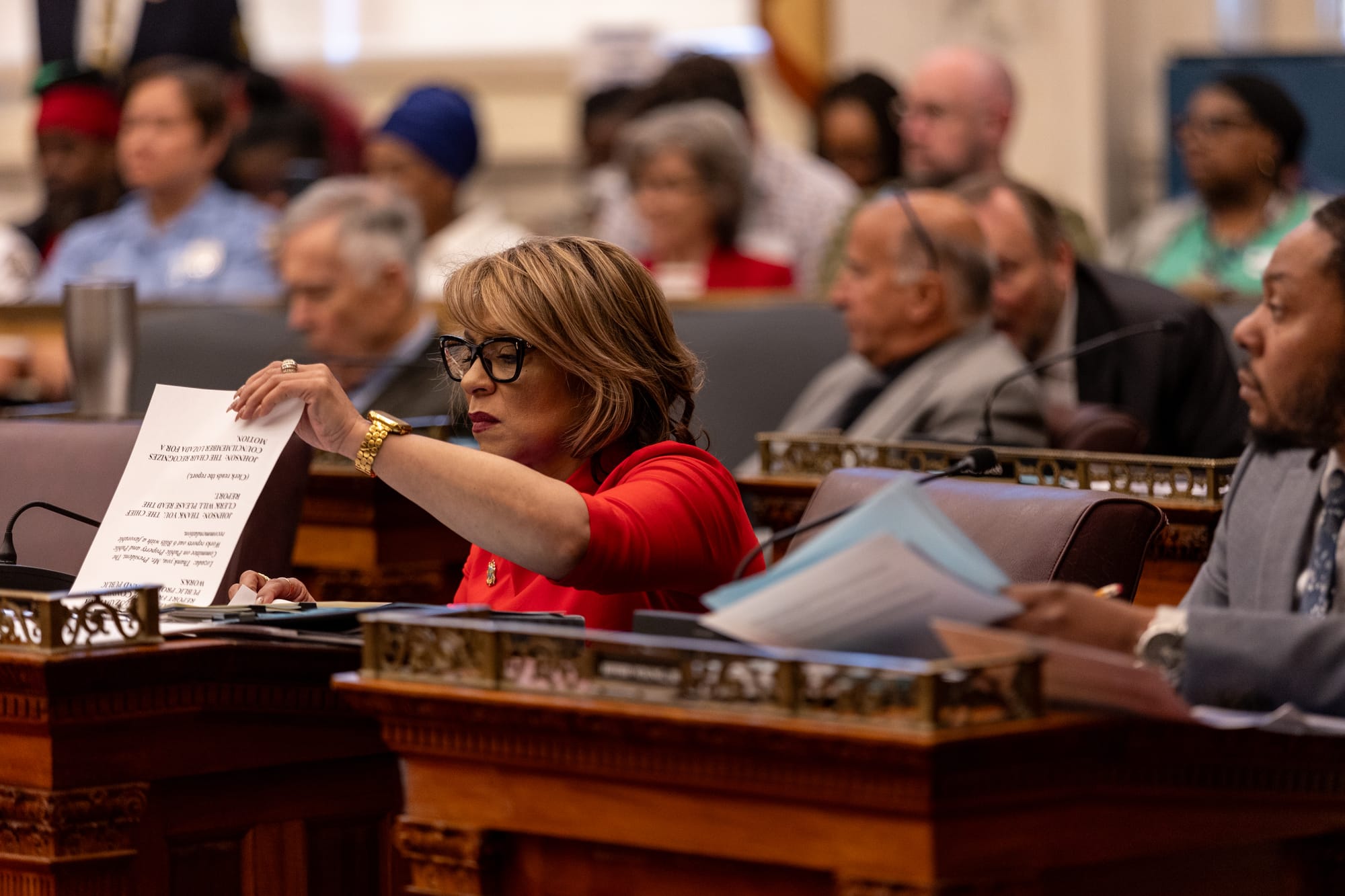
After over an hour of public testimony, Lozada banged her fist on her podium and shouted into her microphone in an impassioned speech. She said mobile providers, religious groups, and other organizations who give out food and clothes will still be allowed to do so.
“How dare you organize and tell people lies... without reading the damn bill,” Lozada said. “How dare you be a provider and accept money from the federal and state and city and then not do the work. Because if you were doing the work, we wouldn't have people dying in our streets.”
“This bill provides people opportunity 24 hours a day ... this bill will coordinate services in a space that will not deplore quality of life ... this bill will take people off of peoples’ sidewalks,” she continued. “Shame on you if you think that we have to continue to do nothing.”
Councilmember Mark Squilla, who represents the 1st District, which also includes a portion of Kensington, said he will not include his district on the bill but will be “watching closely” to see how the legislation plays out over the next six months.
In an interview with Kensington Voice, Squilla said he would like to “see what aspects of it we can do city-wide” and in the 1st District. He said he has heard residents’ concerns about trash, crowds, “nuisance,” and used needles in areas where mobile services operate.
“So if this pilot works out well and people will be able to get those services, without those impacts, then maybe it could be city-wide,” he said. “This is a start. This may not be the holistic approach that works at the end of the day but I think we can learn from it.”
Squilla added that Lozada deserves to see how the bill “plays out” and “tweak it” if needed.
Have any questions, comments, or concerns about this story? Send an email to editors@kensingtonvoice.com.
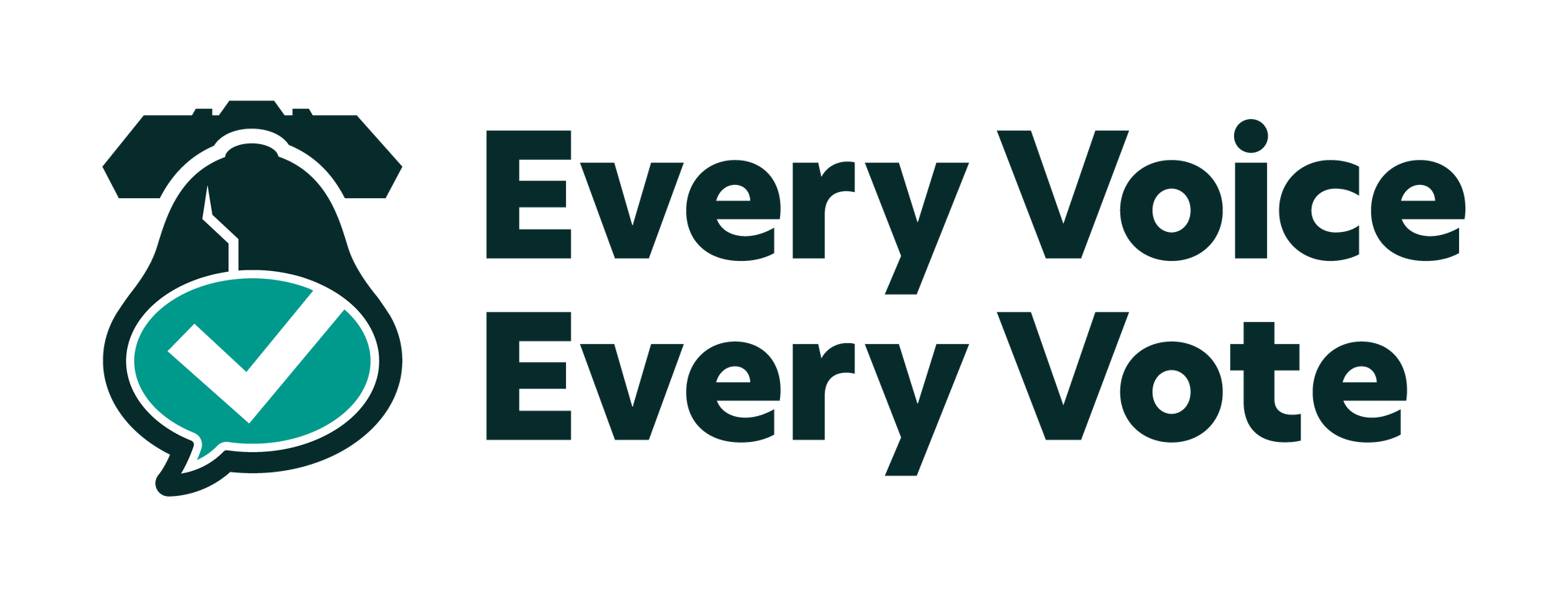
Free accountability journalism, community news, & local resources delivered weekly to your inbox.